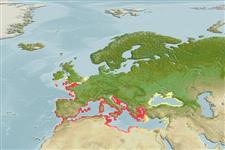Environment: milieu / climate zone / depth range / distribution range
पारिस्थितिकी
समुद्री; खारा ड़िमरसल; औशिनोड़िरोमस (Ref. 51243); गहराई सीमा 10 - 35 m (Ref. 80021). Subtropical; 53°N - 30°N, 10°W - 42°E
Eastern Atlantic and theMediterranean and Black Sea; with dubious records from the Gulf of Suez (Ref. 80021).
आकार / वज़न / Age
Maturity: Lm ? range ? - ? cm
Max length : 15.7 cm TL पुल्लिंग / अलिंग; (Ref. 30504); अधिकतम सूचित उम्र: 10 वर्षो (Ref. 4696)
Occurs in the intertidal zones, among rocks, weeds and pools where the water is usually brackish (Ref. 4343, 5299). Occasionally recorded in freshwater, but there are no documented records of actual occurrence in European freshwaters (Ref. 59043). Macrobenthos feeder on hard substrates (Ref. 92840), feeds on green algae (Enteromorpha), crustaceans (amphipods, crabs), polychaetes, and insects (Ref. 4696).
Benthic spawner.
Miller, P.J., 1986. Gobiidae. p. 1019-1085. In P.J.P. Whitehead, M.-L. Bauchot, J.-C. Hureau, J. Nielsen and E. Tortonese (eds.) Fishes of the North-eastern Atlantic and the Mediterranean. Volume 3. UNESCO, Paris. (Ref. 4696)
IUCN Red List Status (Ref. 130435)
Threat to humans
Harmless
Human uses
मात्स्यिकी: लघु वाणिज्य; आखेट मत्स्य: हां
अधिक जानकारी
संदर्भजलीयकृषिजलीयकृषि रूपरेखाखींचआनुवंशिकीElectrophoresesहैरेटिबिलटीबीमारीप्रक्रमणNutrientsMass conversion
साधन
Special reports
Download XML
इंटरनेट स्रोत
Estimates based on models
Preferred temperature (Ref.
123201): 13.8 - 19.6, mean 18 °C (based on 544 cells).
Phylogenetic diversity index (Ref.
82804): PD
50 = 0.5000 [Uniqueness, from 0.5 = low to 2.0 = high].
Bayesian length-weight: a=0.00912 (0.00725 - 0.01148), b=3.10 (3.06 - 3.14), in cm total length, based on LWR estimates for this species (Ref.
93245).
Trophic level (Ref.
69278): 3.0 ±0.39 se; based on food items.
लौटाव (Ref.
120179): माध्यम, न्यूनतम जनसंख्या दुगनी होने का समय 1.4 - 4.4 वर्ष। (K=0.22; tm=2-3; tmax=10).
Fishing Vulnerability (Ref.
59153): Low vulnerability (10 of 100).
Nutrients (Ref.
124155): Calcium = 160 [77, 360] mg/100g; Iron = 1.22 [0.66, 2.33] mg/100g; Protein = 18.5 [16.6, 20.1] %; Omega3 = 0.365 [0.160, 0.679] g/100g; Selenium = 15.2 [7.7, 31.1] μg/100g; VitaminA = 22.7 [7.0, 64.4] μg/100g; Zinc = 1.45 [0.98, 2.16] mg/100g (wet weight);
